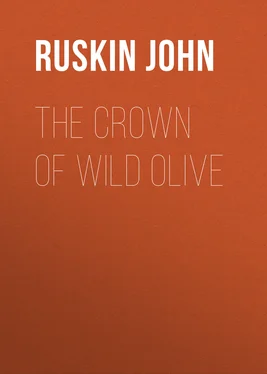John Ruskin - The Crown of Wild Olive
Здесь есть возможность читать онлайн «John Ruskin - The Crown of Wild Olive» — ознакомительный отрывок электронной книги совершенно бесплатно, а после прочтения отрывка купить полную версию. В некоторых случаях можно слушать аудио, скачать через торрент в формате fb2 и присутствует краткое содержание. Жанр: foreign_antique, foreign_home, literature_19, visual_arts, на английском языке. Описание произведения, (предисловие) а так же отзывы посетителей доступны на портале библиотеки ЛибКат.
- Название:The Crown of Wild Olive
- Автор:
- Жанр:
- Год:неизвестен
- ISBN:нет данных
- Рейтинг книги:4 / 5. Голосов: 1
-
Избранное:Добавить в избранное
- Отзывы:
-
Ваша оценка:
- 80
- 1
- 2
- 3
- 4
- 5
The Crown of Wild Olive: краткое содержание, описание и аннотация
Предлагаем к чтению аннотацию, описание, краткое содержание или предисловие (зависит от того, что написал сам автор книги «The Crown of Wild Olive»). Если вы не нашли необходимую информацию о книге — напишите в комментариях, мы постараемся отыскать её.
The Crown of Wild Olive — читать онлайн ознакомительный отрывок
Ниже представлен текст книги, разбитый по страницам. Система сохранения места последней прочитанной страницы, позволяет с удобством читать онлайн бесплатно книгу «The Crown of Wild Olive», без необходимости каждый раз заново искать на чём Вы остановились. Поставьте закладку, и сможете в любой момент перейти на страницу, на которой закончили чтение.
Интервал:
Закладка:
148. "Impossible, absurd, Utopian!" exclaim nine-tenths of the few readers whom these words may find.
No, good reader, this is not Utopian: but I will tell you what would have seemed, if we had not seen it, Utopian on the side of evil instead of good; that ever men should have come to value their money so much more than their lives, that if you call upon them to become soldiers, and take chance of a bullet through their heart, and of wife and children being left desolate, for their pride's sake, they will do it gaily, without thinking twice; but if you ask them, for their country's sake, to spend a hundred pounds without security of getting back a hundred-and-five, 86they will laugh in your face.
149. Not but that also this game of life-giving and taking is, in the end, somewhat more costly than other forms of play might be. Rifle practice is, indeed, a not unhealthy pastime, and a feather on the top of the head is a pleasing appendage; but while learning the stops and fingering of the sweet instrument, does no one ever calculate the cost of an overture? What melody does Tityrus meditate on his tenderly spiral pipe? The leaden seed of it, broadcast, true conical "Dents de Lion" seed—needing less allowance for the wind than is usual with that kind of herb—what crop are you likely to have of it? Suppose, instead of this volunteer marching and countermarching, you were to do a little volunteer ploughing and counter-ploughing? It is more difficult to do it straight: the dust of the earth, so disturbed, is more grateful than for merely rhythmic footsteps. Golden cups, also, given for good ploughing, would be more suitable in colour: (ruby glass, for the wine which "giveth his colour" on the ground, might be fitter for the rifle prize in ladies' hands). Or, conceive a little volunteer exercise with the spade, other than such as is needed for moat and breastwork, or even for the burial of the fruit of the leaden avena-seed, subject to the shrill Lemures' criticism—
Wer hat das Haus so schlecht gebauet?
If you were to embank Lincolnshire more stoutly against the sea? or strip the peat of Solway, or plant Plinlimmon moors with larch—then, in due season, some amateur reaping and threshing?
"Nay, we reap and thresh by steam, in these advanced days."
I know it, my wise and economical friends. The stout arms God gave you to win your bread by, you would fain shoot your neighbours, and God's sweet singers with; 87then you invoke the fiends to your farm-service; and—
When young and old come forth to play
On a sulphurous holiday,
Tell how the darkling goblin sweat
(His feast of cinders duly set),
And, belching night, where breathed the morn,
His shadowy flail hath threshed the corn
That ten day-labourers could not end.
150. Going back to the matter in hand, we will press the example closer. On a green knoll above that plain of the Arve, between Cluse and Bonneville, there was, in the year 1860, a cottage, inhabited by a well-doing family—man and wife, three children, and the grandmother. I call it a cottage, but in truth, it was a large chimney on the ground, wide at the bottom, so that the family might live round the fire; lighted by one small broken window, and entered by an unclosing door. The family, I say, was "well-doing;" at least it was hopeful and cheerful; the wife healthy, the children, for Savoyards, pretty and active, but the husband threatened with decline, from exposure under the cliffs of the Mont Vergi by day, and to draughts between every plank of his chimney in the frosty nights.
"Why could he not plaster the chinks?" asks the practical reader. For the same reason that your child cannot wash its face and hands till you have washed them many a day for it, and will not wash them when it can, till you force it.
151. I passed this cottage often in my walks, had its window and door mended; sometimes mended also a little the meal of sour bread and broth, and generally got kind greeting and smile from the face of young or old; which greeting this year, narrowed itself into the half-recognizing stare of the elder child, and the old woman's tears; for the father and mother were both dead,—one of sickness, the other of sorrow. It happened that I passed not alone, but with a companion, a practised English joiner, who, while these people were dying of cold, had been employed from six in the morning to six in the evening, for two months, in fitting, without nails, the panels of a single door in a large house in London. Three days of his work taken, at the right time from fastening the oak panels with useless precision, and applied to fasten the larch timbers with decent strength, would have saved these Savoyards' lives. He would have been maintained equally; (I suppose him equally paid for his work by the owner of the greater house, only the work not consumed selfishly on his own walls;) and the two peasants, and eventually, probably their children, saved.
152. There are, therefore,—let me finally enforce, and leave with the reader, this broad conclusion,—three things to be considered in employing any poor person. It is not enough to give him employment. You must employ him first to produce useful things; secondly, of the several (suppose equally useful) things he can equally well produce, you must set him to make that which will cause him to lead the healthiest life; lastly, of the things produced, it remains a question of wisdom and conscience how much you are to take yourself, and how much to leave to others. A large quantity, remember, unless you destroy it, must always be so left at one time or another; the only questions you have to decide are, not what you will give, but when , and how , and to whom , you will give. The natural law of human life is, of course, that in youth a man shall labour and lay by store for his old age, and when age comes, shall use what he has laid by, gradually slackening his toil, and allowing himself more frank use of his store; taking care always to leave himself as much as will surely suffice for him beyond any possible length of life. What he has gained, or by tranquil and unanxious toil continues to gain, more than is enough for his own need, he ought so to administer, while he yet lives, as to see the good of it again beginning, in other hands; for thus he has himself the greatest sum of pleasure from it, and faithfully uses his sagacity in its control. Whereas most men, it appears, dislike the sight of their fortunes going out into service again, and say to themselves,—"I can indeed nowise prevent this money from falling at last into the hands of others, nor hinder the good of it from becoming theirs, not mine; but at least let a merciful death save me from being a witness of their satisfaction; and may God so far be gracious to me as to let no good come of any of this money of mine before my eyes."
153. Supposing this feeling unconquerable, the safest way of rationally indulging it would be for the capitalist at once to spend all his fortune on himself, which might actually, in many cases, be quite the rightest as well as the pleasantest thing to do, if he had just tastes and worthy passions. But, whether for himself only, or through the hands, and for the sake, of others also, the law of wise life is, that the maker of the money shall also be the spender of it, and spend it, approximately, all, before he dies; so that his true ambition as an economist should be, to die, not as rich, but as poor, as possible, 88calculating the ebb tide of possession in true and calm proportion to the ebb tide of life. Which law, checking the wing of accumulative desire in the mid-volley, 89and leading to peace of possession and fulness of fruition in old age, is also wholesome, in that by the freedom of gift, together with present help and counsel, it at once endears and dignifies age in the sight of youth, which then no longer strips the bodies of the dead, but receives the grace of the living. Its chief use would (or will be, for men are indeed capable of attaining to this much use of their reason), that some temperance and measure will be put to the acquisitiveness of commerce. 90For as things stand, a man holds it his duty to be temperate in his food, and of his body, but for no duty to be temperate in his riches, and of his mind. He sees that he ought not to waste his youth and his flesh for luxury; but he will waste his age, and his soul, for money, and think he does no wrong, nor know the delirium tremens of the intellect for disease. But the law of life is, that a man should fix the sum he desires to make annually, as the food he desires to eat daily; and stay when he has reached the limit, refusing increase of business, and leaving it to others, so obtaining due freedom of time for better thoughts. 91How the gluttony of business is punished, a bill of health for the principals of the richest city houses, issued annually, would show in a sufficiently impressive manner.
Читать дальшеИнтервал:
Закладка:
Похожие книги на «The Crown of Wild Olive»
Представляем Вашему вниманию похожие книги на «The Crown of Wild Olive» списком для выбора. Мы отобрали схожую по названию и смыслу литературу в надежде предоставить читателям больше вариантов отыскать новые, интересные, ещё непрочитанные произведения.
Обсуждение, отзывы о книге «The Crown of Wild Olive» и просто собственные мнения читателей. Оставьте ваши комментарии, напишите, что Вы думаете о произведении, его смысле или главных героях. Укажите что конкретно понравилось, а что нет, и почему Вы так считаете.












